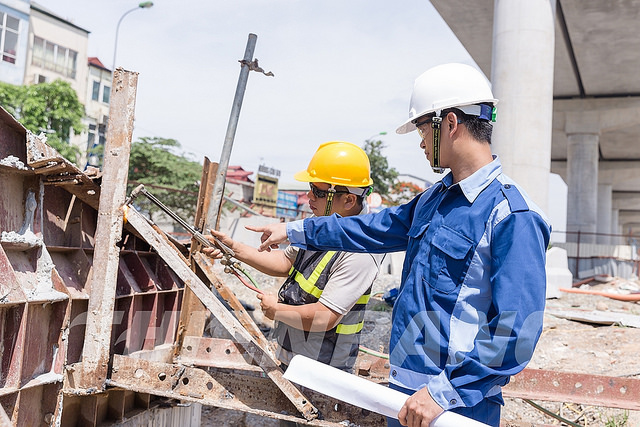Recently, the Ministry of Labor, Invalids, and Social Affairs issued Circular 06/2020/TT-BLDTBXH on the promulgation of the List of jobs with strict requirements on occupational safety and hygiene.

From October 5, 2020, there are a total of 32 groups of jobs requiring strict OSH regulations (illustrative image)
Enclosed with Circular 06/2020/TT-BLDTBXH is the list of jobs requiring strict safety and labor hygiene regulations, specifically:
Manufacture, assembly, operation, maintenance, repair, dismantling, inspection, safety technical testing of labor, and supervision of the operation of machines, equipment listed as requiring strict safety and labor hygiene regulations issued by the Ministry of Labor, Invalids, and Social Affairs.
Directly producing, using, storing, and transporting hazardous chemicals, as classified by the globally harmonized system of classification and labeling of chemicals.
Testing, producing, using, storing, and transporting various types of explosives and explosive accessories.
Operation, maintenance, repair, dismantling, inspection, supervision of the operation of machines and equipment including: hammers, dredgers, pumps; grouting pumps, mortar mixers, mortar sprayers, concrete sprayers; concrete grinders, cutters, roughening machines; multi-function demolition machines; hand drills; concrete mixing plants, crushing and screening plants for construction materials; excavators, diggers, bulldozers, graders, compaction machines; operation of dump trucks with a load of over 5 tons.
Direct assembly, operation, repair, maintenance, and cleaning of various types of machinery including grinders, saws, milling machines, planers, lathes, bending machines, cutting machines, chopping machines, punching machines, stamping machines, chiseling machines, shaping machines, feeding and discharging machines, crushers, grinders, mixers, rolling machines, centrifuges, dryers, screeners, presses, paper-mill machines, coating machines, rolling machines, de-barking machines, packing machines; hydraulic jacks; polishing machines, sanders, conveyor belts, water guns, pneumatic guns; industrial printing machines.
Directly making molds, casting, cleaning, plating, cleaning metal surfaces; metal processing; ore smelting, coke handling; working at cement rotary kiln areas, refractory material kilns, production of calcium carbide, operating, repairing, inspecting, monitoring, feeding, discharging products, and waste disposal at roasting, firing, and smelting furnaces.
Working at heights from 2 meters above the working platform, on mobile work platforms, in hazardous high places.
Jobs on rivers, at sea, on water surfaces, on offshore platforms, diving, diving supervision; manufacturing, building, operating, repairing, maintaining, inspecting machinery and equipment in ship hulls and watercraft.
Jobs with ionizing radiation, radioactivity, nuclear operations; operating screening machines that use nuclear radiation, electromagnetic fields.
Jobs with high-frequency electromagnetic fields ranging from 3KHz and above.
Forest planning investigation; geological and topographical surveys, marine fieldwork, geophysics; surveying, exploring, mining, and processing minerals, oil and gas; manufacturing, using, operating, maintaining, repairing facilities, and equipment in the fields of mineral and oil extraction, onshore and offshore oil and gas products.
Construction jobs including: construction supervision; construction surveying; executing, installing construction projects; repairing, renovating, relocating, restoring, demolishing constructions; construction warranty and maintenance; operating and trial running constructions.
Working in confined spaces or those likely to generate toxic gases such as tunnels, tanks, wells, pipes, and underground constructions; operating and maintaining gas pipelines; industrial cleaning, environmental sanitation, barn sanitation, wastewater treatment, waste disposal, and sewerage cleaning.
Operating, maintaining, repairing, testing, and safety inspecting electrical equipment, power transmission lines, and power plants; operating battery charging stations, repairing, and maintaining batteries.
Welding and cutting metal work.
Directly operating trains, electric trains; driving, repairing, and maintaining all types of cars.
Direct production and processing of building materials, ceramics, porcelain, glass, plastic.
Professional rescue and emergency responders.
Direct production and processing of leather, feathers; dyeing work; processing silk.
Direct wood cutting, sawing, logging, and processing industrial wood; regularly handling manual loads of 30 kg or more.
Direct cooking and processing food in communal kitchens serving 300 or more meals a day.
Medical examination and treatment; caring for people with disabilities and patients; surgical pathology, forensic examination, microbiological tests; jobs in the pharmaceutical field.
Testing and producing veterinary drugs; preserving genetic strains, microbial strains, parasites; disinfecting the environment; food testing, disinfection.
Direct animal slaughtering, caring for, and raising large animals in production and business establishments; training service dogs, wild animals, snakes, crocodiles, and disposing of infected animals.
Operating fuel pumps, oil, liquefied gas; repairing gas tanks, oil tanks, fuel delivery, wholesale, retail gasoline.
Direct processing of rubber latex, rosin.
Direct operation and processing of production lines for beer, alcohol, soft drinks, cooking oil, confectionery, milk.
Circus performers, animal trainers; professional athletes, fitness, and sports trainers.
Working with computer screen devices including: air traffic control, remote control.
Direct cremation and burial work.
Special jobs in the military field listed as heavy, hazardous, dangerous, and specially heavy, hazardous, and dangerous occupations.
Direct operation of engine-powered machinery in agriculture including threshers, harvesters, harrows, mowers, pesticide sprayers, water pumps.
The current list of jobs requiring strict safety and labor hygiene regulations is stipulated in Circular 13/2016/TT-BLDTBXH, which includes only 17 groups of jobs requiring strict safety and labor hygiene regulations. However, from October 5, 2020, this list has been changed, with an additional 15 groups of jobs requiring strict safety and labor hygiene regulations, totaling 32 groups of jobs.
For details, see Circular 06/2020/TT-BLDTBXH, effective from October 5, 2020, replacing Circular 13/2016/TT-BLDTBXH.
Le Hai
 Article table of contents
Article table of contents









